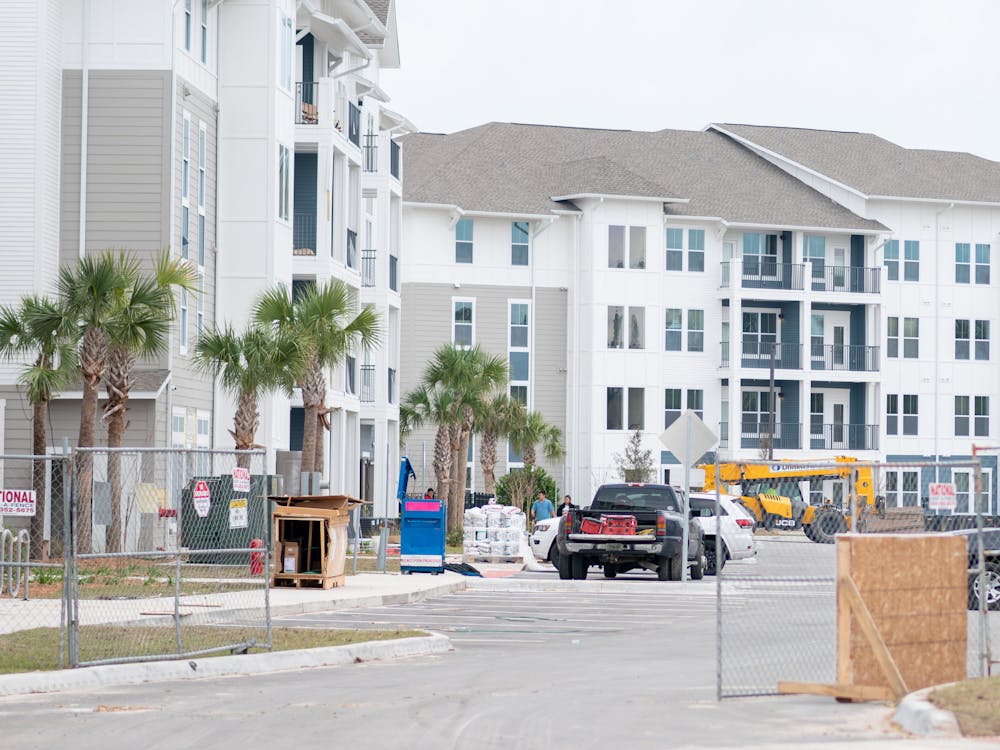To Laura Bittner, a 36-year-old Gainesville resident, the city no longer looks like it used to.
As more residential developments are constructed, Bittner is worried about how the city’s culture and social dynamics will change. Many recently constructed residential buildings do not fit the historical aesthetic of Gainesville, she wrote in an email.
“My friends and [I] liken their appearance to prison buildings most of the time,” she said. “These buildings lack the character and local color that local-owned homes and businesses in the area have historically had.”
To Bittner, these physical differences embody a larger shift in Gainesville’s image, she said.
“The town’s character is changing,” she said.
Five residential projects were proposed in 2023, said Miranda Searing, the city of Gainesville’s development review coordinator. Four were proposed in 2022, 17 in 2021 and 15 in 2020; 78% of the projects were in approved status, according to the city of Gainesville.
On top of the physical environment changing in Gainesville, rent and the cost of living have increased in recent years, Bittner said. This makes it even harder to afford to “have places to gather for artistic purposes,” which contribute to Gainesville’s existence as a place of music and art, she said.
As more residential developments are being constructed, Bittner is also concerned about adverse effects on the environment. She has witnessed spaces being cleared for various kinds of development, she said.
“Developers wantonly cut down old live oaks and other trees, because it’s cheaper to do that than preserve the trees,” she said. “I was utterly heartbroken to see all the live oaks get massacred behind El Indio, which the back of now looks like a wasteland.”
Bittner is concerned for the local environment in general and is surprised Gainesville is not taking more environmental precautions, especially with UF as a potential source of innovative ideas, she said.
“I ask myself all the time why the waterways here are so polluted, when we allegedly have the best science minds in our local university,” she said. “Or why no thought was put into protecting animals who would obviously frequent Depot Park since it is a huge, natural-looking body of water.”
With the city’s number of residential developments gradually increasing, Bittner believes that even more action should be taken to conserve the local environment, she said.
“Local officials and organizations should protect the environment in terms of urbanization,” she said.
Searing said projects must pass certain criteria — including factors of environmental impact — to be approved for construction.
“Gainesville is committed to minimizing its environmental footprint by diligent oversight and regulation,” she wrote in an email. “Proposed projects are required to be reviewed for environmental impacts on a federal, state, county and city level.”
While fewer total projects have been proposed in recent years, there has been an increase in the number of units, with approximately 3,265 units and 7,809 bedrooms created, Searing said.
Thomas Twitchell, a 70-year-old retired journalist, lives just outside of the Gainesville city limits in Longleaf Village off Archer Road. The biggest indicator of recent residential development nearby has been the increased traffic he’s experienced, he said.
“It’s getting harder and harder to pull out on Archer Road and cars back up there in the late afternoon when people are coming home,” Twitchell said.
While Twitchell said he has no strong desire for Gainesville’s size to increase, he understands the growth is inevitable.
“Development just keeps coming and coming and coming,” he said. “I wish it wouldn’t happen, but I know it will.”
With more residential developments being constructed, Twitchell believes it is important to establish more efficient public transportation in and around the city, he said.
“I figure, as long as we’re going to have to live here, that we should do it in an orderly way,” he said. “To me, a big part of that is transportation.”
Twitchell occasionally visits Los Angeles and other large cities and has taken note of their modes of public transportation. One that stands out to him is light rail, he said.
“I’ve read that light rail can spur development in some areas,” he said. “I think that might be the case here, you know, put on light rail and then have a mix of new housing along the way.”
Although he recognizes Gainesville’s need for growth, Twitchell worries it is happening too quickly to keep up with.
“I wish the town wouldn’t grow so much,” he said. “It was so nice when I got here. It’s still nice, but it’s just growing too much, too fast.”
Contact Bailey Diem at bdiem@alligator.org. Follow her on X @BaileyDiem.
Bailey Diem is the Spring 2025 Metro Editor and a second-year journalism major. She has spent past semesters reporting for the university and metro desks. In her free time, Bailey enjoys playing guitar or getting lost in a book.






